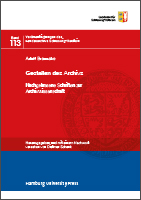Gestalten des Archivs/Nachgelassene Schriften zur Archivwissenschaft. Herausgegeben und mit einem Nachwort versehen von Dietmar Schenk
Author(s)
Schenk, Dietmar
Collection
AG UniversitätsverlageLanguage
GermanAbstract
Adolf Brenneke (1875-1946), archivist and Northern German regional historian, is above all a classic of archival science. After decades of archival practice, he began teaching at the Prussian School of Archives in Berlin-Dahlem in 1931. In connection with his lecture, he dealt historically-typologically with "Gestalten des Archivs" ("Shapes of the Archive") and, based on the principle of provenance, designed an archive doctrine of order. In doing so, he drew on the intellectual motifs of historicism. Thus he dealt with the history of Johann Gustav Droysen, Friedrich Meinecke's conception of history and the psychology of the humanities of the Dilthey student Eduard Spranger. Due to the circumstances of the "Third Reich", Brenneke was unable to complete his archival studies until his death a few months after the end of the war. His pupil Wolfgang Leesch, however, published Brenneke's "Archival Studies" in 1953 in edited form. With this edition, the original manuscripts are now also made accessible. The focus is on the "archive articles" found in the estate for a non-fiction dictionary of German history that did not come into being. The archive scientist and theorist Dietmar Schenk also illuminates the contexts of the history of ideas and science in a detailed epilogue.
Keywords
19th century; 20th century; archive science; order theory; history theoryDOI
10.15460/HUP.LASH.113.183ISBN
9783943423501OCN
1082957851Publisher
Hamburg University PressPublication date and place
Hamburg, 2018Series
Veröffentlichungen des Landesarchivs Schleswig-Holstein, 113Classification
History


 Download
Download Web Shop
Web Shop